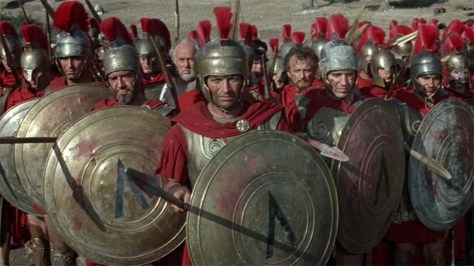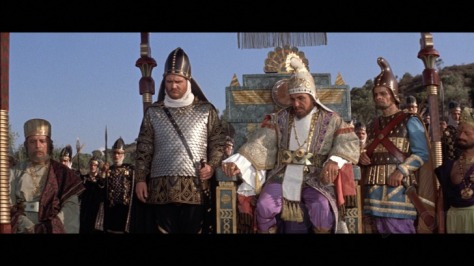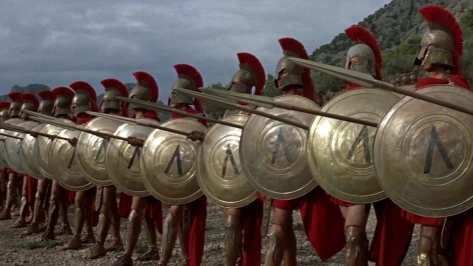The 1960,s were a great time to be a film fan, there were some wonderful movies doing the rounds and it was a time also of new ground breaking productions in the form of James Bond, Hammer Horror, Italian westerns and a number of historical fact based movies which included THE CHARGE OF THE LIGHT BRIGADE, ZULU, LAWRENCE OF ARABIA, KHARTOUM and pictures such as THE 300 SPARTANS. The latter I have to admit was and still remains a favourite of mine, based on a factual event where a small group of brave and fearless Spartan warriors spearheaded a small Greek army to defend the country from the invading Persian hordes. Of course being a Hollywood/UK production the movie did have certain scenarios that probably did not happen, and these fleshed out a story that would have just been about a battle that took place, at THERMOPYLAE. The film was made with the co-operation of the Greek government who agreed to let filming take place in the village of Perachora, The film which was shot in Cinerama was originally to be entitled THE LION OF SPARTA. It starred American actor Richard Egan in the role of the Spartan King Leonidas, who attempted to persuade the Spartans to allow him to commit his full army to the fight, but the Spartan government would not allow this because of a religious festival. Leonidas decided that he must go and promised the Greeks that he would stand with them, but he could only take his own personal bodyguard of 300 troops who were not bound by the constrictions of the government.

The remainder of the cast was impressive, with Sir Ralph Richardson, David Farrar and Diane Baker all creating memorable performances. Directed by Rudolph Mate, it is a convincing and action-packed movie, and one that is still to this day shown regularly on TV. It was a story of the underdog, 300 against 5 Million. But against the odds the 300 managed to hold the hordes and give Greece a chance to muster its forces. Many critics at the time of the films release saw in THE 300 SPARTANS situations and scenarios that were comparable with the Cold War with Russia and its Warsaw pact allies, the Greeks representing the freedom and democracy of the free world (the West) and the advancing Persians representing the Eastern European aggressors who were spurred on and supported by their Masters in the Kremlin.

But for the majority of cinema goers it was simply a historical movie, based partly on true events, which made it even more entertaining and enjoyable. Considering it was a popular movie it is unbelievable that the score for the movie, which was composed by Greek Maestro, Manos Hajidakis was never released at the time of the films release, and still remains so today. The soundtrack was an important and integral component of the movie, matching the realistic battle scenes and also supporting the tender and more romantic moments within the picture.
The score was fully symphonic, with the composer utilising all the Epic movie musical trademarks, such as fanfares, driving battle themes, strident and patriotic marches and lush and lavishly pitted romantic interludes. Adding to this various Greek ethnic sounding instrumentation, and several Persian or Asian flavoured dance cues for the scenes within the Persian camp. The one track on the score that stands out for me aside from the central march theme, is the piece that accompanies the Spartans as they move towards the Persian ranks, Hajidakis adding a flourish of sinewy and edgy sounding strings to accompany the Spartan long spears as they are aimed at their foe, it is one of those moments in film where the music and the images or actions work perfectly in unison , and create a special moment that we all remember.

The rousing theme which accompanies the Spartan warriors as they march to do battle is prominent throughout the movie, with Hajidakis arranging and orchestrating the piece differently to underline and enhance the many scenarios and situations. Silva Screen records did re-record a version of the theme, but the entire score has as far as I am aware never been issued in any format. So somewhere I am sure in the depths of the 20TH CENTURY FOX archive lies a tape marked, THE 300 SPARTANS, whether that is in the UK the USA or even Greece I do not know, but for a classic score such as this not to be released is sacrilege. Hajidakis was particularly active during the 1960.s after the success of NEVER ON A SUNDAY and later working on soundtracks for films such as PHAEDRA and TOPKAPI. He was I suppose the Greek equivalent of Riz Ortolani, by this I mean he managed to cross-over and work on both Greek and Non-European productions, writing scores that were vibrant and highly thematic in their content and construction and even manging to enter the American and UK pop charts with various themes from his soundtracks.
Manos Hatzidakis (Hajidakis) was born in, Xanthi Greece on October 25th 1925. During his career as a composer and also his involvement with numerous films as a composer he attained a prominent and respected position amongst many fans and also his peers. Hatzidakis was the son of a lawyer, but when his parents separated in 1932, his Mother took the seven-year-old and moved to Athens. Three years before this he had begun his musical education via piano lessons, as well as being taught how to play violin and accordion. In 1938 his Father was killed in an air crash and as the war began to take hold the family found themselves in dire straits financially, it was down to the young Hatzidakis to support his family thus he began to work in a photography shop as well as working on the docks unloading ice and then later he became an assistant nurse at the military hospital. As well as multi-tasking all these roles he decided to try and expand his musical knowledge and began to study advanced musical theory and philosophy at the University of Athens.
It was not until 1946 that the composer began to write music for films, his first assignment being ADOUILOTOI SKIAVOI, but it was not until 1949 that Hatzidakis began to become more involved with film scoring, writing the soundtracks for two movies in that year. In a composing career that spanned fifty years (1944-1994) he wrote the scores for over forty films and also focused upon non film music projects during this period. He passed away on June 15th, 1994 he was 68 years of age.









Where can I buy the 300 Spartans 1962 movie soundtrack? werewolf92392@ yahoo.com for point of contact. Thank you
Hi fred sadly there is no soundtrack release. Although there is a cue on a silva screen compilation Warriors. If that helps best wishes jm
Thank.you. I wonder why they never did. Surely some where in greece there must be a copy.
A few years ago when they issued Blue by hajidakis onto cd ot was rumoured that 300 spartans was next. But it never happened. I contacted the late composers estate but they said the tapes were lost. It’s one of the great scores that will never be released.